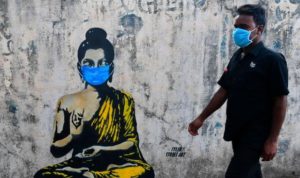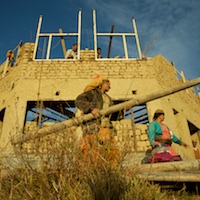The Paragliding World Cup Association (PWCA) is organising a major international paragliding competition, labeled as a ‘Pre-World Cup’, in Bir on 24-30 October, after a five-year hiatus.
Urban Development Minister of Himachal Pradesh, Mr. Sudhir Sharma, who is also president of the Billing Paragliding Association, the official host of the event, projects that approximately 200 pilots will participate in the competition.
Both Indian and foreign pilots will compete, including some of the world’s top pilots. The first prize is set at Rs 2.5 lakh (approximately US $4000), with several other valuable prizes at stake, including a 23-carat gold medal for the winner.
While such a high-profile event brings cachet to the Bir-Billing area, it has stirred some controversy over concerns about the possibility of a few of the foreign participants staying in Tibetan homes instead of registered hotels. In years past, it has been common practice for some foreign visitors to rent rooms in the homes of both Indian and Tibetan families, which provides a more interesting cultural experience for the visitors, and is often the only option when all of the registered hotels and guest houses in Bir are fully booked, as is not infrequently the case during major events such as this competition.
Naturally, most of these visitors are unaware that there are regulations requiring all foreign guests to complete ‘C forms’ for overnight stays, and to register for ‘Protected Area Permits‘ when staying overnight in the Bir Tibetan Colony, because such regulations are not clearly posted, and the PAP is not required in most other areas in Himachal Pradesh. Thus, there is no dependable way for the foreign tourists to know in advance about these requirements. Also, Since Bir is not a border area or a strategically sensitive region, there is no obvious reason for the permit restrictions, leaving many tourists confused and frustrated.
It is also unclear why the Tibetans are singled out in the controversy. News media have cited ‘security concerns‘ but there have been no security incidents in Bir in the past, and no specific security threat has been named in the present, leaving many to believe the concern is baseless or even fabricated, and resulting in complaints from both local business proprietors and tourists.
In the eyes of some local residents and foreign visitors alike, this policy, which they view as overly and unnecessarily strict and discriminatory, is an embarrassment for both the HP government and the Indian government and damages Bir’s reputation. As one visitor observed, it would be simple enough to train the Tibetan hosts to use C forms and allow them to participate in Himachal’s family homestay programme in the same way that Indian families are allowed to do.
Whatever one’s opinion on that issue, it is obvious that a clearer and friendlier solution will be required for future international events, in order to preserve Bir’s attractive reputation as a relaxed and desirable destination for ecotourism. Local hoteliers and employees of the budding paragliding cottage industry are hoping the government will relax its overly restrictive policies to ensure that visitors to Bir will have a positive experience and the local ecotourism economy can continue to grow.


